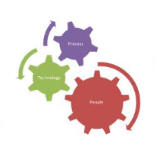Manufacturing expertise
The post-ERP organization will need a different set of roles and skill than
those with less integrated kinds of systems. At a minimum, everyone who uses
these systems needs to be trained on how they work, how they relate to the
business process and how a transaction tipples through the entire company
whenever they press a key. The training will never end, it is an ongoing process
so new people will always be coming in, and new functionality will always be
entering the organization.
In every business function and department that is ERP-enabled you will need
more than one staff who know the system and its relation to the departmental
process. It is these people who have to guide, motivate and help their
colleagues by working along with them. They will answer questions, find needed
work around and let you know what is working and what isn't. These people will
be the ERP team representatives in each department. It is a nice idea that these
people have a dual reporting relationship; with their managers and with the ERP
in-charge.
Consultants
 Throughout the ERP life cycle, consultants and subject matter experts can
assist the project team with various activities including developing a business
case, package selection, process documentation, change management, training,
project management and functional knowledge. While hiring consultants adds to the projectís cost, they bring critically important skills
to the project not available in-house.
Throughout the ERP life cycle, consultants and subject matter experts can
assist the project team with various activities including developing a business
case, package selection, process documentation, change management, training,
project management and functional knowledge. While hiring consultants adds to the projectís cost, they bring critically important skills
to the project not available in-house.
Consultants should be knowledgeable, experienced professionals who can
provide top-level management and the project team with analyses that support
important decisions with clear articulation of the associated issues, relevant
evidence and a candid discussion of alternatives. As outsiders, their unbiased
recommendations can be invaluable in an ERP implementation, but, at the same
time, the ultimate responsibility and authority belongs to
the company and should be exercised by the project team and the executive
sponsor. Good consultants empower their clients to make the best decisions
by effectively transferring knowledge throughout the project life cycle
to the project team.

